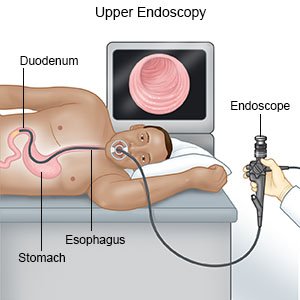Allergic Esophagitis
Medically reviewed by Drugs.com. Last updated on Sep 23, 2025.
What is allergic esophagitis?
Allergic esophagitis is a condition that causes your esophagus to swell and narrow when your body reacts to allergens. An allergen is anything you are allergic to, such as certain foods, dust, or pollen.
 |
What increases the risk for allergic esophagitis?
Anyone can get allergic esophagitis. The following increase the risk:
- Asthma or seasonal allergies
- Being male
- A family history of allergic esophagitis
What are the signs and symptoms of allergic esophagitis?
- Trouble swallowing
- Throat pain during swallowing
- Food stuck in the esophagus
- Heartburn or chest pain
How is allergic esophagitis diagnosed?
Your healthcare provider will ask about your symptoms and when they began. Tell him or her if you know certain foods cause your symptoms. Tell him or her if you have any medical conditions or a family history of allergic esophagitis. You may also need any of the following:
- Allergy tests are used to see how your body reacts to certain allergens. The tests may show what is causing your allergic esophagitis.
- A barium swallow x-ray is used to take pictures inside your esophagus. You will swallow barium in a thick liquid before you have the x-ray. The barium helps any injuries show up better on the x-rays.
- Endoscopy is used to find any tissue changes. A scope is used to see inside the esophagus. A scope is a long, bendable tube with a light on the end. The scope is placed in your mouth and passed down your throat and esophagus. A camera may be hooked to the scope to take pictures.

- A biopsy is used to take tissue samples from your esophagus to be tested. The samples may also be checked for any other problems with your esophagus.
How is allergic esophagitis treated?
Allergic esophagitis may not go away completely. Treatment may help relieve your symptoms.
- Steroid medicine may help decrease swelling in your esophagus. You will swallow the medicine so it coats your esophagus.
- Stomach acid medicine helps keep heartburn symptoms under control.
- Dilatation is a procedure used when the esophagus narrows from swelling. An endoscope is placed into your mouth and down your throat. Tools on the endoscope press against the tissues to widen your esophagus. Dilatation can improve your symptoms but will not stop allergic esophagitis from happening.
What food changes may be needed for allergic esophagitis?
You may need to stop eating certain foods for a while to see if your symptoms improve. Start eating these foods again one at a time as directed. If certain foods cause your symptoms, do not eat them. Some common examples are dairy, nuts, eggs, and seafood. You may need to change what you eat to relieve your symptoms. You may need to see a dietitian to help you get the right amount of nutrients.
Call your local emergency number (911 in the US) if:
- Food is stuck in your throat.
- You have chest pain.
When should I seek immediate care?
- You vomit blood.
- Your bowel movements are black and sticky.
- You feel weak or dizzy.
When should I call my doctor?
- You have a fever.
- You have white patches on your tongue and inside your mouth.
- You lose weight without trying.
- It is hard to swallow or it hurts to swallow, even after treatment.
- You have questions or concerns about your condition or care.
Care Agreement
You have the right to help plan your care. Learn about your health condition and how it may be treated. Discuss treatment options with your healthcare providers to decide what care you want to receive. You always have the right to refuse treatment. The above information is an educational aid only. It is not intended as medical advice for individual conditions or treatments. Talk to your doctor, nurse or pharmacist before following any medical regimen to see if it is safe and effective for you.© Copyright Merative 2025 Information is for End User's use only and may not be sold, redistributed or otherwise used for commercial purposes.
Learn more about Allergic Esophagitis
Treatment options
Care guides
Symptoms and treatments
Further information
Always consult your healthcare provider to ensure the information displayed on this page applies to your personal circumstances.
